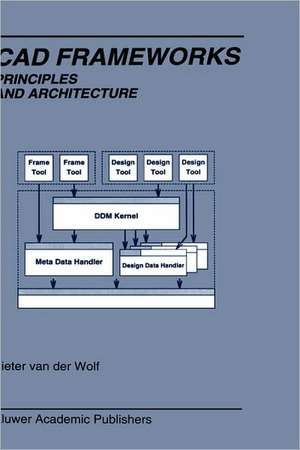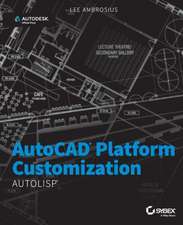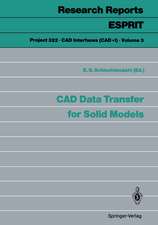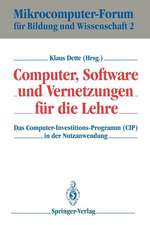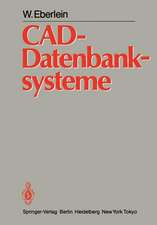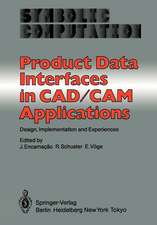Cad Frameworks: Principles and Architecture: The Springer International Series in Engineering and Computer Science, cartea 288
Autor Pieter van der Wolfen Limba Engleză Hardback – 30 sep 1994
CAD Frameworks: Principles and Architecture describes the design and construction of CAD frameworks. It presents principles for building integrated design environments and shows how a CAD framework can be based on these principles. It derives the architecture of a CAD framework in a systematic way, using well-defined primitives for representation. This architecture defines how the many different framework sub-topics, ranging from concurrency control to design flow management, relate to each other and come together into an overall system.
The origin of this work is the research and developmentperformed in the context of the Nelsis CAD Framework, which has been a working system for well over eight years, gaining functionality while evolving from one release to the next. The principles and concepts presented in this book have been field-tested in the Nelsis CAD Framework.
CAD Frameworks: Principles and Architecture is primarily intended for EDA professionals, both in industry and in academia, but is also valuable outside the domain of electronic design. Many of the principles and concepts presented are also applicable to other design-oriented application domains, such as mechanical design or computer-aided software engineering (CASE). It is thus a valuable reference for all those involved in computer-aided design.
| Toate formatele și edițiile | Preț | Express |
|---|---|---|
| Paperback (1) | 941.82 lei 6-8 săpt. | |
| Springer Us – 23 oct 2012 | 941.82 lei 6-8 săpt. | |
| Hardback (1) | 947.85 lei 6-8 săpt. | |
| Springer Us – 30 sep 1994 | 947.85 lei 6-8 săpt. |
Din seria The Springer International Series in Engineering and Computer Science
- 24%
 Preț: 1041.98 lei
Preț: 1041.98 lei - 20%
 Preț: 643.50 lei
Preț: 643.50 lei - 18%
 Preț: 1225.62 lei
Preț: 1225.62 lei - 18%
 Preț: 965.02 lei
Preț: 965.02 lei - 20%
 Preț: 646.12 lei
Preț: 646.12 lei - 18%
 Preț: 948.79 lei
Preț: 948.79 lei - 20%
 Preț: 646.62 lei
Preț: 646.62 lei - 15%
 Preț: 637.46 lei
Preț: 637.46 lei - 20%
 Preț: 643.83 lei
Preț: 643.83 lei - 18%
 Preț: 949.23 lei
Preț: 949.23 lei - 20%
 Preț: 644.48 lei
Preț: 644.48 lei - 20%
 Preț: 994.92 lei
Preț: 994.92 lei - 20%
 Preț: 645.97 lei
Preț: 645.97 lei - 18%
 Preț: 946.87 lei
Preț: 946.87 lei - 20%
 Preț: 995.57 lei
Preț: 995.57 lei - 18%
 Preț: 956.99 lei
Preț: 956.99 lei - 20%
 Preț: 644.98 lei
Preț: 644.98 lei - 15%
 Preț: 649.54 lei
Preț: 649.54 lei - 18%
 Preț: 950.21 lei
Preț: 950.21 lei - 18%
 Preț: 1221.38 lei
Preț: 1221.38 lei - 18%
 Preț: 957.62 lei
Preț: 957.62 lei - 15%
 Preț: 643.99 lei
Preț: 643.99 lei - 18%
 Preț: 948.47 lei
Preț: 948.47 lei - 18%
 Preț: 947.35 lei
Preț: 947.35 lei - 20%
 Preț: 1284.65 lei
Preț: 1284.65 lei - 20%
 Preț: 1628.31 lei
Preț: 1628.31 lei - 20%
 Preț: 1285.78 lei
Preț: 1285.78 lei
Preț: 947.85 lei
Preț vechi: 1155.91 lei
-18% Nou
Puncte Express: 1422
Preț estimativ în valută:
181.43€ • 197.14$ • 152.50£
181.43€ • 197.14$ • 152.50£
Carte tipărită la comandă
Livrare economică 21 aprilie-05 mai
Preluare comenzi: 021 569.72.76
Specificații
ISBN-13: 9780792395010
ISBN-10: 0792395018
Pagini: 225
Ilustrații: IX, 225 p.
Dimensiuni: 155 x 235 x 14 mm
Greutate: 0.51 kg
Ediția:1994
Editura: Springer Us
Colecția Springer
Seria The Springer International Series in Engineering and Computer Science
Locul publicării:New York, NY, United States
ISBN-10: 0792395018
Pagini: 225
Ilustrații: IX, 225 p.
Dimensiuni: 155 x 235 x 14 mm
Greutate: 0.51 kg
Ediția:1994
Editura: Springer Us
Colecția Springer
Seria The Springer International Series in Engineering and Computer Science
Locul publicării:New York, NY, United States
Public țintă
ResearchCuprins
1 Introduction.- 1.1 The Need for CAD Frameworks.- 1.2 The Search for CAD Frameworks.- 2 State of the Art and Requirements.- 2.1 The Evolution of CAD Frameworks.- 2.2 State of the Art in Framework Architectures.- 2.3 Principal Requirements.- 2.4 Conclusion.- 3 Global Framework Model.- 3.1 Introduction.- 3.2 Global Run-Time View.- 3.3 Coarse-Grain Data Management.- 3.4 Design Transaction Model.- 3.5 The Framework Architecture Definition Process.- 4 Data Modeling.- 4.1 Introduction.- 4.2 Data Models.- 4.3 The OTO-D Semantic Data Model.- 4.4 Discussion.- 5 The Information Architecture.- 5.1 Introduction.- 5.2 Design Objects.- 5.3 Projects.- 5.4 Teams of Design Engineers, An Example.- 5.5 Design Transactions.- 5.6 View Types.- 5.7 Versioning.- 5.8 Hierarchy.- 5.9 Equivalence Relationships.- 5.10 The Interplay among Versioning, Hierarchy and Equivalence.- 5.11 Sharing Design Data Across Projects.- 5.12 Design Flow Management.- 5.13 Conclusion.- 6 The Component Architecture.- 6.1 Introduction.- 6.2 Framework Kernel and Framework Tools.- 6.3 The Framework Kernel.- 6.4 The Data Handling Component.- 6.5 The Meta Data Handling Component.- 6.6 The Design Data Handling Component.- 6.7 The Data and Design Management Kernel.- 6.8 The Data and Design Management Interface.- 6.9 Framework Tools.- 6.10 Summary and Conclusion.- 7 The Implementation Architecture.- 7.1 Introduction.- 7.2 Implementation Primitives.- 7.3 Process Organization.- 7.4 Project Identification and Initialization Procedure.- 7.5 RPC Protocol Specification.- 7.6 Application of Shared Memory IPC.- 7.7 Performance.- 7.8 Summary and Conclusion.- 8 Conclusion.
